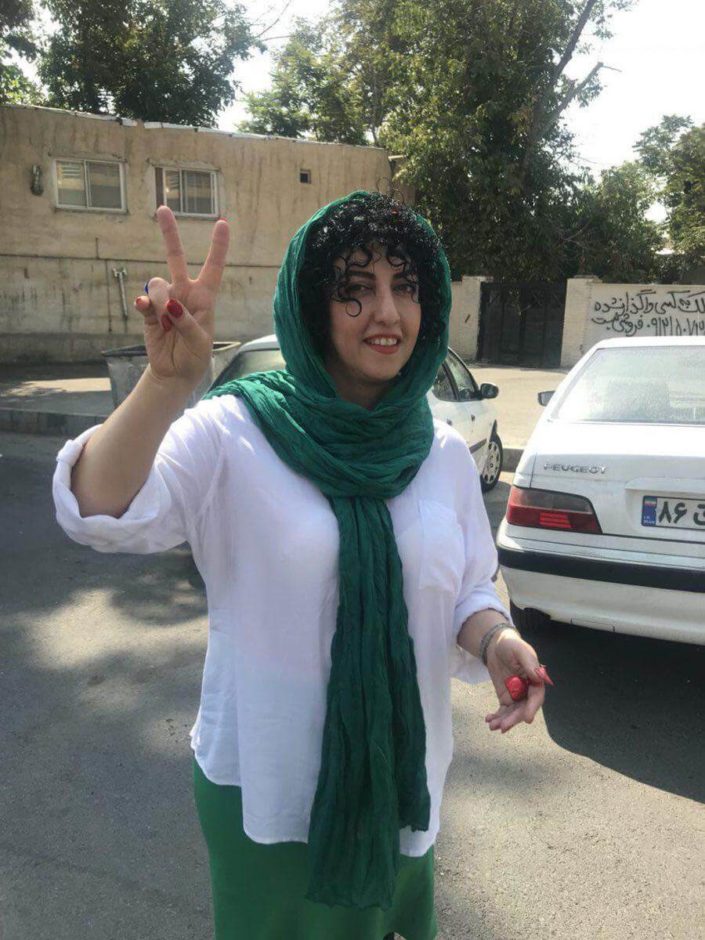


Narges Mohammadi is an Iranian journalist and high-profile human rights campaigner. She is the vice-president of the Defenders of Human Rights Centre (DHRC) and has also campaigned tirelessly for the abolition of the death penalty in Iran. In 2011 she was awarded the prestigious Per Anger Prize by the Swedish government for her human rights work.
After several years of persecution by the Iranian state, Mohammadi was arrested at her home on 5 May 2015 and taken to Evin Prison. A year later, on 18 May 2016, the Revolutionary Court of Iran sentenced Mohammadi to sixteen years imprisonment on numerous counts. These included, ‘founding and running an illegal organisation’ (referring to ‘Legam: Step by Step to Stop the Death Penalty’), ‘taking part in assembly and collusion against national security’ and ‘spreading propaganda against the system.’ In December 2019, after participating in a peaceful sit-in protest in Evin prison, Mohammadi was physically abused by security officials and transferred to Zanjan prison (300 km from Tehran).
During her imprisonment Mohammadi has suffered from serious, frequently untreated, health issues. She has also been denied the right to access to her children.
PEN calls for her immediate and unconditional release: please join us.
Spread the word
PEN members are encouraged to share this appeal and your messages on social media with the hashtag #FreeNarges.
Write to the authorities
Write a letter of appeal following the template below:
• Expressing serious concern for the health of Narges Mohammadi, urging the authorities to permit her access to all necessary medical care as a matter of urgency;
• Calling for the immediate and unconditional release of Narges Mohammadi and all those detained for exercising their right to freedom of expression;
• Demanding a full investigation into reports that Mohammadi is being ill-treated and denied adequate medical care in prison.
Send the appeals to:
Leader of the Islamic Republic
Grand Ayatollah Sayed ‘Ali Khamenei
The Office of the Supreme Leader Islamic Republic Street
End of Shahid Keshvar Doust Street,
Tehran,
Islamic Republic of Iran
Email: : [email protected] http://rouhani.ir/register.php
Twitter: @khamenei_ir (English-language account), @Khamenei_ar(Arabic-language), @Khamenei_es (Spanish-language account).
Head of the Judiciary
Ebrahim Raisi c/o Public Relations Office
Number 4, Deadend of 1 Azizi – Vali Asr Street Tehran,
Islamic Republic of Iran
President of the Islamic Republic of Iran
Hassan Rouhani
Pasteur Street,
Pasteur Square Tehran, Islamic Republic of Iran
Email: [email protected] http://rouhani.ir/register.php
Twitter: @HassanRouhani (English) and @Rouhani_ir (Persian)
We also encourage you to send copies to the Embassy of Iran in your country. You can find embassy addresses here.
In 2009 Mohammadi was banned from travelling abroad. The following year she was arrested without warrant and held due to her work with the Defenders of Human Rights Centre (DHRC).
In 2011 she was convicted of ‘membership of the DHRC’, ‘acting against the national security’, visiting political prisoners and cooperating with Nobel Laureate, Shirin Ebadi. Mohammadi was also accused of generating ‘propaganda against the regime’, as she had reported on human rights violations and conducted interviews with foreign media outlets. Her eleven year sentence was reduced to six years on appeal in January 2012. She began her sentence in Evin prison on 21 April 2012 but was released on bail two months later after a serious decline in her health.
On 5 May 2015, Mohammadi was arrested at her home and taken once again to Evin Prison. Her trial was regularly postponed. A year later, on 18 May 2016, the Revolutionary Court of Iran sentenced Mohammadi to sixteen years imprisonment for ‘founding and running an illegal organisation’ (referring to ‘Legam: Step by Step to Stop the Death Penalty’), ‘taking part in assembly and collusion against national security’ and ‘spreading propaganda against the system.’
Speaking to the International Campaign for Human Rights prior to her arrest, Mohammadi said:
I have been ‘charged’ with every single civil activity I have engaged in since my release from Zanjan Prison in August 2012, such as participating in gatherings on women’s rights, air pollution, and [Rouhani’s] Citizenship Rights Charter. I was also accused of honouring families of political prisoners at meetings, or attending a gathering with Gonabadi Dervishes in front of the Prosecutor’s Office, or giving interviews to media outside Iran. I told them there that when you fit all my civil activities into these two charges, it means that I must remain silent and still.
In December 2019, after participating in a peaceful sit-in protest in Evin prison, Mohammadi was physically abused by security officials and transferred to Zanjan prison (300 km from Tehran). She was further accused by the Governor of Evin prison, Mr Gholamreza Ziaei, of ‘disrupting the general calm in Women’s Ward by organising gatherings and singing loudly’.
Throughout Mohammadi’s imprisonment there has been serious concern over her health. Mohammadi suffers from pulmonary embolism (a blot clot in the lung) as well as a neurological condition which can result in temporary partial paralysis as well as seizures. Reports following health incidents have revealed that Mohammadi has, on more than one occasion, been prematurely returned to prison, against medical advice; been handcuffed to her hospital bed; and been poorly treated by prison guards during her transfer to hospital.
Recently, in May 2019, following a sharp deterioration in her health, the prison authorities transferred Mohammadi to a hospital where she underwent an emergency hysterectomy. However, after surgery Mohammadi was immediately transferred back to Evin prison where she has reportedly been denied necessary medication including antibiotics. Consequently, Mohammadi’s surgery wounds became infected, and the infection entered her bloodstream.
Mohammadi has suffered countless injustices at the hands of the Iranian State and prison authorities. Now, with Covid-19 entering prison wards, Mohammadi and many others are facing what has been termed a ‘passive’ death sentence.
Mohammadi has been awarded both the Alexander Langer Award (2009) and the Per Anger Prize (2011) for her human rights work. She was one of awardees of the 2013 PEN/Oxfam Novib Free Expression Award.
Image credit: Mohammadi family